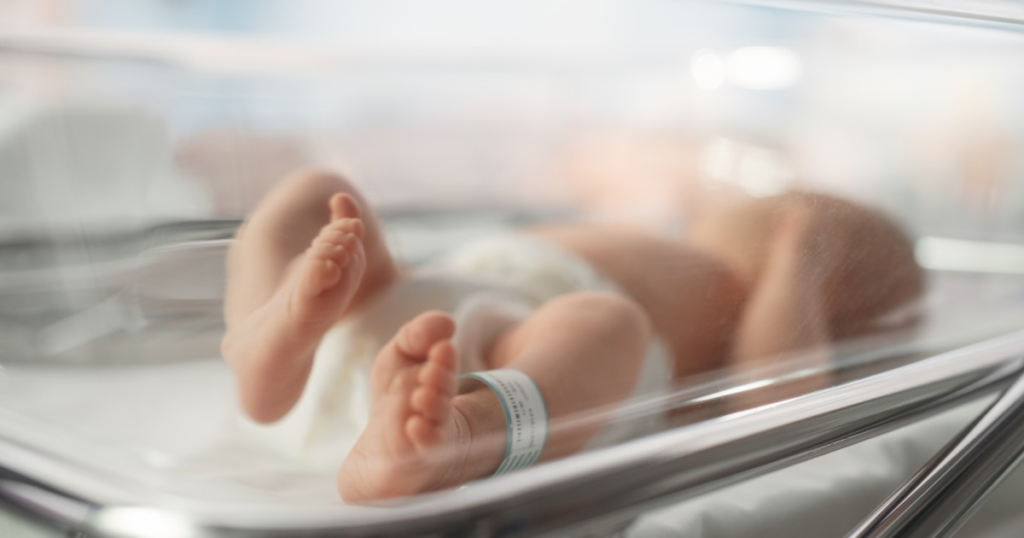In a world where medical advancements and diagnoses are often considered to be near foolproof, one extraordinary case in China has shattered expectations and raised more questions than answers.
A 36-year-old woman from Hangzhou, Zhejiang province, found herself in the midst of a bizarre and unexpected situation when she gave birth just hours after learning she was pregnant.
To add to the mystery, the woman, identified as Gong, had been previously diagnosed with infertility and had even been advised to lose weight before considering in vitro fertilization (IVF).
Her story has captivated the attention of people worldwide, sparking conversations about the nature of medical diagnoses, infertility, and the sometimes unpredictable ways in which human biology operates.
This shocking incident has not only captured the curiosity of social media users across China but has also raised important questions about the accuracy of infertility diagnoses, the effectiveness of medical treatments, and the hidden realities behind seemingly unexplained pregnancies.
Read : Bizarre! Newcastle Races Delayed by 34 Minutes Because Pesky Golfers Were Crossing the Track
What makes this story even more intriguing is the speed at which the events unfolded. Just four hours after discovering she was pregnant, Gong gave birth via an emergency caesarean section, defying all expectations. Let’s delve deeper into the details of this unusual case and examine the potential factors behind such an extraordinary turn of events.
A Diagnosis Shattered: From Infertility to Pregnancy in Hours
Gong’s journey to this unexpected revelation began when she visited Zhejiang Provincial People’s Hospital for treatment for high blood pressure. What was supposed to be a routine medical appointment quickly took an unbelievable turn when doctors discovered that Gong was over eight months pregnant—a fact that came as a complete shock to her.
Prior to this visit, Gong had no idea that she was carrying a child. She had been struggling with infertility, a condition that doctors had previously attributed to a rare womb syndrome. This condition led to a diagnosis that she would never be able to conceive naturally, much less carry a pregnancy to term.
Read : Bizarre Video of Chinese Car Getting Pregnant Goes Viral on the Internet: Watch Here
For Gong and her husband, the infertility diagnosis had been a heavy blow. The couple had been considering IVF as a way to start a family but had been advised against it. Doctors had told Gong that she needed to lose weight before she could undergo any fertility treatments, putting their plans on hold.
Despite their efforts to understand and address her condition, Gong never thought she would be able to conceive. Yet, four hours after her hypertension checkup, she found herself in the delivery room, giving birth to a healthy baby boy who weighed 2 kg.

The situation is baffling to many, including medical professionals, and highlights the unpredictability of reproductive health. Gong’s case serves as a reminder that infertility diagnoses, while based on certain medical conditions, do not always account for the complexities of human biology.
In Gong’s case, the combination of her obesity and infertility diagnosis made it difficult for doctors to detect any signs of pregnancy. Gong’s body had shown minimal outward signs—her weight gain was not significant, and she had not felt any noticeable fetal movement.
These factors, combined with her existing health conditions, meant that she did not seek prenatal care, leading to the unexpected and rapid delivery.
Medical Perspectives: The Role of Weight and Misdiagnosis
One of the most puzzling aspects of Gong’s story is the relationship between her weight and the lack of pregnancy signs. According to Dr. Yang Liwei, an obstetrician at Zhejiang Provincial People’s Hospital, women who are overweight or obese often experience less noticeable pregnancy symptoms due to the body’s fat distribution.
In such cases, the typical signs of pregnancy, such as weight gain and fetal movement, may be minimal or go unnoticed altogether. This can delay the recognition of pregnancy, leading to situations where women are unaware of their condition until it is too late for proper prenatal care.
Dr. Liwei pointed out that in Gong’s case, the absence of significant weight gain and the lack of obvious fetal movement may have contributed to her not realizing she was pregnant. As a result, she did not receive prenatal care, which is crucial for ensuring the health and safety of both the mother and the baby during pregnancy.

Without the regular checkups and tests that pregnant women typically undergo, the risks associated with an undiagnosed pregnancy are heightened, particularly if complications arise during labor. This scenario is not an isolated incident. The hospital revealed that several years ago, another woman, who weighed 100 kg, was admitted for surgery and discovered she was 23 weeks pregnant.
While these cases are rare, they highlight a critical issue in the healthcare system—obese women and those with certain medical conditions may be at a higher risk of being misdiagnosed or not receiving timely medical interventions during pregnancy.
The lack of proper prenatal care can lead to complications for both mother and child, as evidenced by Gong’s case, where an emergency caesarean section had to be performed due to her critical condition.
The Impact of Infertility Diagnoses: A Journey of Emotional Struggles
Gong’s story also sheds light on the emotional and psychological impact of infertility diagnoses. For many women struggling with infertility, the diagnosis can feel like the end of the road in terms of their dreams of having a family. The emotional toll of infertility treatments, the endless tests, and the failed attempts can leave women feeling hopeless and devastated.
The weight of a diagnosis like Gong’s, which seemed to offer little room for optimism, can be overwhelming. Many women, like Gong, turn to IVF as a last hope for conceiving, only to face barriers such as weight restrictions or other health-related complications.
What makes Gong’s story even more remarkable is the sheer surprise and joy she must have felt upon learning she was pregnant just hours before giving birth. After years of believing that pregnancy was impossible for her, the news of her pregnancy was undoubtedly a whirlwind of emotions.

The transition from infertility diagnosis to childbirth within hours must have been both exhilarating and surreal. However, it also raises deeper questions about how the medical community views infertility, its diagnoses, and the limitations of our understanding of reproductive health.
For Gong, the sudden realization of her pregnancy must have been both a blessing and a challenge. While the joy of having a child would be overwhelming, the lack of prenatal care and the unforeseen nature of her pregnancy may have left her with feelings of uncertainty and anxiety.
As much as this story represents a miracle for Gong, it also underscores the importance of careful medical observation, especially for women who may be at higher risk of unnoticed pregnancies due to weight or other factors.
Gong’s extraordinary story serves as a reminder that medical diagnoses, particularly infertility diagnoses, are not always definitive. Human biology is complex, and medical conditions may not always manifest in predictable ways.
Gong’s case illustrates that even when a woman has been diagnosed with infertility and has been told she could not conceive, nature can still surprise us.
This incident also highlights the need for a deeper understanding of how factors such as weight, health conditions, and lifestyle can affect reproductive health.

While Gong’s weight played a significant role in the lack of visible pregnancy symptoms, her story also shows that many women, particularly those who are overweight or obese, may not receive the appropriate medical attention to detect pregnancy early.
This underscores the importance of regular medical checkups and early screenings, especially for women who may be at higher risk of undiagnosed pregnancies.
Ultimately, Gong’s unexpected journey from infertility to childbirth is a testament to the mysteries of human biology and the ways in which medical diagnoses can sometimes miss the mark.
Her story is both an uplifting reminder of the possibilities that still exist for women facing infertility and a cautionary tale about the need for more comprehensive care and attention when it comes to women’s reproductive health.

